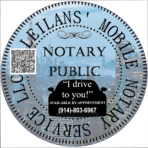Electronic Notarization FAQs (Updated and Simplified)
What’s New in NY Notary Laws?
The NY Executive Law Section 135-c now allows notaries to perform electronic notarizations. Starting February 1, 2023, notaries can register as Electronic Notaries with the Department of State.
What is an Electronic Notary?
An electronic notary is a registered notary public authorized to perform electronic notarial acts, including remote notarizations and traditional services.
How Do Electronic Notarial Acts Work?
Electronic notarial acts use approved software to securely notarize documents. Remote acts involve audio-visual communication to verify identity through:
- Personal knowledge of the signer.
- Acceptable ID verified via technology.
- Oath/affirmation of a witness known to the notary.
Recordings of remote notarizations must be kept for 10 years.
What is “Papering Out”?
“Papering out” is converting an electronically notarized document into a certified physical copy. Notaries can charge $2 for this process.
What is Remote Ink Notarization (RIN)?
RIN involves using technology to notarize physical documents remotely. This practice ended in NY on January 31, 2023, replaced by electronic notarization.
What Fees Apply for Electronic Notarization?
Notaries may charge:
- $25 per electronic notarial act.
- $2 for papering out a document.
Who Approves Notary Platforms?
Notaries must use software platforms that meet NYS requirements. The Department of State does not endorse specific providers.
What’s Required for an Exemplar?
Exemplars (digital signatures/seals) are mandatory for electronic notaries. Submit yours via your NY Business Express account.
Are Notaries Required to Keep Journals?
Yes. All notaries must maintain a journal for 10 years, recording:
- Date, time, and type of notarial act.
- Signer’s name, address, and ID type.
- Verification methods used.
Electronic notaries must also keep audio-video recordings.
Do Signers Need to Be in NY?
No, but notaries must be in NY during electronic notarizations. For signers outside the U.S., additional verification rules apply.
Can Electronically Notarized Documents Be Filed?
Yes, through the papering-out process, county clerks and offices will accept certified tangible copies of electronic documents.
What Are Credential Analysis & Identity Proofing?
- Credential Analysis: Verifies authenticity of government-issued IDs.
- Identity Proofing: Confirms signer’s identity via public/private data.
What Happens if a Non-Notary Performs Notarization?
Documents notarized by uncommissioned individuals may still be valid under Section 142-a of Executive Law. Seek legal advice if necessary.
Corporate Office
- 60 Glenwood Ave, Suite LL, Yonkers, NY 10701
- info@leilanmns.com
- 914-803-6967
Service Area
New York
New Jersey
Connecticut
COPYRIGHT © 2015-2025 LEILANS’ MOBILE NOTARY SERVICE LLC. – ALL RIGHTS RESERVED.
Disclaimer: I am not an attorney licensed to practice law and may not give legal advice about immigration, or any other legal matter or accept fees for legal advice.

